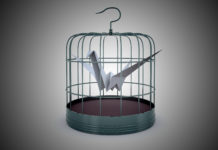In our nation’s history, in the face of fear, we have often risen to achieve noble goals. Other times we have behaved tragically — for instance, interning and seizing property from Japanese Americans during World War II. Certainly, there were spies among us then. Only in hindsight did we recognize that our treatment of the larger group — who were not — was gravely mistaken.
We are on the verge of witnessing such an event in our own time. We are now experiencing an understandable collective desire for action in the wake of horrifying mass killings, many in our public schools. In response, we see federal legislation gaining momentum (e.g. H.R. 2646, unfortunately known as the Helping Families in Mental Health Crisis Act). This bill threatens individuals diagnosed with serious mental illness with an increased loss of civil rights — and a terror that too many others do not understand.
Dr. Renée Binder, president of the American Psychiatric Association, has written, “As research shows, the overwhelming majority of individuals [diagnosed] with mental illness will never be violent toward others.”
As Dr. Larry Davidson, director of Yale Medical School’s recovery program has also written, the impact of the ongoing fear-driven public image regarding violence is “extremely hurtful to tens of millions of Americans who are working hard at their recovery.“
So much essential evidence — deeply relevant to the legislation at hand — has been left out of the public discourse. If included, this evidence would allow us to see, together, the tragedy we are on the verge of enacting. This includes the voices of so many individuals like myself, who have recovered from or are in-recovery from experiences diagnosed as serious mental illness.
This includes significant empirical evidence, much of it published in mainstream mental health sources, including psychiatry’s preeminent journals. This evidence contradicts the overly simplistic assumptions underlying HR 2646 — assumptions about diagnosis, medication, recovery and the role of trauma.
For example, Larry Davidson and Dr. David Roe have documented what too many legislators, members of the public — and even professionals and family members of those who are still struggling — are not aware of. Rigorous long-term studies demonstrate between one-quarter and two-thirds of those diagnosed with a serious mental illness recover to “resume personal, social, and vocational activities within what is considered a normal range.”
Davidson and Roe also described being “in recovery” as the process of “overcoming the effects of being a mental patient — including poverty, substandard housing, isolation, unemployment, loss of valued social roles and identity, loss of sense of self and purpose in life, and iatrogenic effects of involuntary treatment and hospitalization — in order to retain or resume some degree of control over their own lives.”
Yes, the mental health care system needs significant rebuilding — including our responses to individuals in crisis — but these changes need to be made with a view of the larger picture, including the documented realities of mental health recovery. (For a more nuanced introduction to the evidence than this space allows — including my own recovery story — please see slides 18-53 from my 2015 American Association of Suicidology Conference powerpoint)
The current legislation not only targets so many individuals who will never be violent. It also threatens to end those programs which already exist — which are moving us toward a more genuinely trauma-informed and recovery-oriented approach to overwhelming emotional distress.
For more information about the real threats posed by HR 2646, and what you might do to help, please see http://realmhchange.org/ and http://www.ncmhr.org/.
* * * * *
This blog is adapted from Jim Probert’s opinion article, appearing in the
print edition of The Gainesville Sun this coming Sunday, December 13 2015















Jim,
Nice article.
I found your account of your own breakdown/recovery which is not so different than my own in terms of the experience in the hospital and the overwhelming emotions. It was hard to find the link within the cluster of other articles on your site so you might want to link directly to the actual article next time.
Yes the current discourse is ridiculous for many reasons including that there’s no way of finding a cutoff point regarding who is “mentally ill” or not nor a reliable way of ever predicting the few who may become violent. The real purpose of the debate is to find a scapegoat and divert attention away from the fact that unless America has far fewer guns per capita, mass shootings will continue to happen every few weeks indefinitely. We can be pretty confident that a few weeks from now another 10-20 people will be gunned down. That’s why I’ve stopped reading the mainstream news because it is so negative and doesn’t reflect what is going on in most people’s lives.
I’d say also that things are already so bad in American mental health that preserving the status quo is much of an accomplishment. The lack of therapy and peer support resources, the ridiculous and harmful conceptualization of emotional suffering as brain illnesses requiring drugs, the existing forced treatment… stopping this bill won’t change any of that. We need actual positive change, not just stopping this bill, and actual positive change is a long way away. Too bad that currently it’s only the minority of people with financial resources, external support and some preexisting awareness mostly who can extricate themselves from the maw of the psychiatric system.
Lastly I think this bill is unlikely to be enacted because only less than 5% of bills in Congress ever get signed. A lot of people don’t know that… so this bill is not that likely to go through. Of course that doesn’t mean we shouldn’t advocate against this piece of BS.
Report comment
Thank you. I’m glad my account resonated in some ways with yours.
And, yes, the lack of resources available to those without financial means–and even in many instances to those with–is heartbreaking.
Report comment
Hey, Jim. It’s terrific to see that you got an Op-Ed into the Gainesville Sun. Muy bueno. Congratulations. I’m very glad they are letting you get something in there. It’s got to contrast, somewhat anyway, with the usual fare offered by the Sun.
A couple of comments…
There are two Murphy bills, and so while people go after the bill that Tim Murphy put forward, please, don’t ignore s. 1945, the Mental Health Reform Act of 2015, that Cris Murphy and others have put forward. I’ve heard it referred to to as the Senate version of the Murphy bill. This is something that is actually too similar to the house bill, and that we don’t need slipped in under our noses, and through the side door.
Second, and I imagine this is just because our approaches to the same problem differ so appreciably, I wouldn’t say, as you do, that “the mental health system needs significant rebuilding”. I would say, contrariwise, that the “mental health” system needs to be entirely dismantled. It is more than a semantic issue at stake when what is not illness, fundamentally, is taken for such, and this is, at the same time, where so many of those rights that make us human get waylaid. It’s ironic to speak, in this sense, of “stigma”, when the “stigma” we are speaking of has been legislated into law.
Anyway, I know how difficult it can be to get into the newspaper, or even to be heard over the noise on campus, and so I congratulate you for managing to do so. Regards.
Report comment
Just as when it comes to “rethinking psychiatry” I would prefer to dethink it, when it comes to “rebuilding” “the mental health system”, I’d personally like to see it debuilt. There are a heck of a lot of stupid laws on the books right now, and I include in the stupid law category mental health law.
Report comment
Is anyone else concerned about this “realmchange” being repeatedly cited like it’s the flagship for anti-murphy organizing?
Report comment
Anyway, congrats to the author & let’s hope he has people prepared to the counter the response, which I imagine will involve mh types kindly “correcting” him while trying to pat him on the head.
Report comment
Thank y0u, Frank.
It is true, as you say, we have often disagreed about how we might move toward a better state of affairs. At least, it seems we are in agreement about not supporting these two bills.
Jim
Report comment
” in the wake of horrifying mass killings, many in our public schools” and all of them in gun free zones or soft targets. But we do need a convenient scapegoat. The mentally ill will serve that purpose until enough Muslim with heated blood can take their places. The American public gets so easily manipulated. Kill a few people somewhere and beat the drum for one thing or another. Does it ever occur to serious people that there might be something psychopathic about America’s leadership?
It is hard even to imagine Federal Agencies taking their job seriously–like the FDA. We are constantly subjected to experimentation with GMO’s, fluoride, vaccinations containing aluminum, etc. Little surprise some people flip. We are constantly inundated with false stories by the MSM. I am not sure that the current President has on any serious occasion told the truth. And we have a number of billionaires who sport humanitarian values and also want the population down to half a billion. Who experiment on poor kids in India and put sterilization drugs in Kenyan vaccinations for women. Etc.
No, so called mental illness may be a very healthy response to a very nasty immoral society!
Report comment
So true, this country has been taken over by the wrong people. Case in point, psychiatrists believe those of us who think 9.11.2001 was disgusting, including the never ending wars and mass murders that have resulted because of it, are “mentally ill” due to our disgust at 9.11.2001. Those who understand the fraud and evil behind the Federal Reserve banking system and agree with Thomas Jefferson that “The issuing power should be taken from the banks and restored to the people, to whom it properly belongs,” are now also considered the “mentally ill.” Those who believe fiscally irresponsible “too big to fail banks” shouldn’t have their lawyers creating fake documents so they may steal homes from recently widowed women with small children, are also among the “mentally ill.” Those who believe in the constitution are also now among the “mentally ill.” Anyone who believes child molesters should be arrested, rather than the abused children or their concerned mothers being turned into “schizophrenics” with the neuroleptic and antidepressant drug cocktails for profit is “mentally ill.” Anyone who believes any psychiatric drug can ever have any adverse effects whatsoever, suffers from anosognosia, and lacks insight into their scientifically invalid “lifelong, incurable, [iatro]genic, mental illness,” too. Anyone who believes in God or the Holy Spirit or Jesus’ teachings is “mentally ill,” according to my psychiatrists too. The wrong people have taken control of the USA, and it’s banking system. From what group of people did those who profited off of 9.11 come, and who are the completely fiscally responsible bankers currently running the Federal Reserve? What group of people does the Holy Bible forewarn us about in the end? The “… of Satan.” But, anyone who believes in the Holy Bible, rather than the DSM “bible,” is “mentally ill,” according to psychiatry and those currently in charge, it appears. What a shame the wrong people have taken over my country.
Report comment
oops, irresponsible, not responsible bankers
Report comment